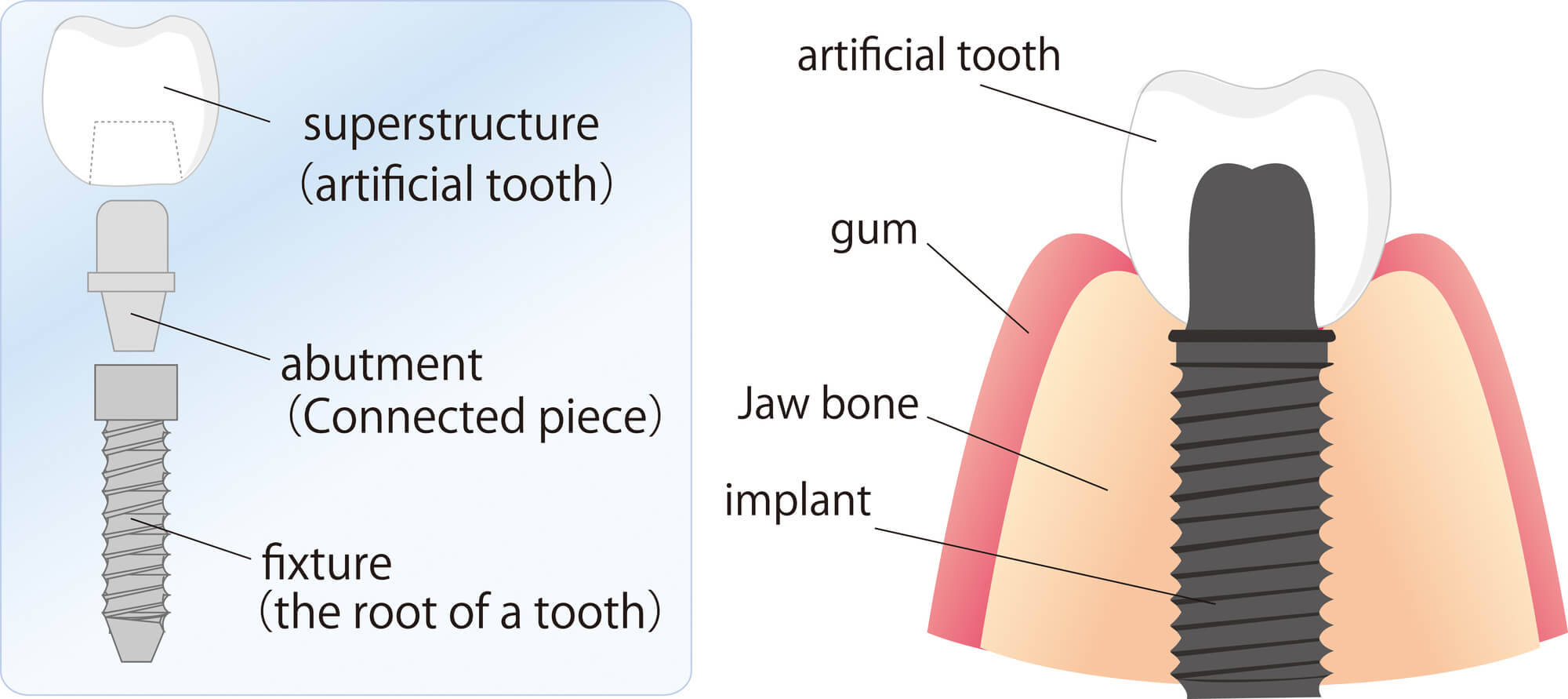Clinics that offer dental implants in Stuart have a good reputation for improving oral health and appearance for a good reason. Dental implants have gone a long way since they were first introduced in 1965 and have already made a difference in many people’s lives. However, to truly understand why dental implants have a significant impact on the world of dentistry, you must look at and understand each component.
Dental implants may look unusual because of their shape and size; however, they offer many benefits for individuals looking to replace one or more missing teeth. Reach out to our Vero Beach, FL, dental office at (772) 778-5550 to learn more about dental implants.

What Are Dental Implants?
Dental implants are a revolutionary solution for replacing missing teeth. These prosthetic tooth roots are crafted from titanium, a material known for its strength and biocompatibility. During dental implant procedures, the implant is surgically inserted directly into the jawbone, where it provides the necessary stimulation to keep the bone healthy and prevent bone loss. This process ensures that the jawbone remains robust and capable of supporting the implant.
Once the implant is securely in place, it serves as a stable foundation for a custom restoration, such as a dental crown, denture, or dental bridge. The restoration is attached to the implant using an abutment, which ensures maximum stability and prevents any slipping or movement. This makes dental implants an excellent choice for those looking to replace missing teeth with a solution that looks, feels, and functions like natural teeth.
Types of Dental Implants
There are several types of dental implants available, each designed to address different dental needs:
- Single-tooth implants: Ideal for replacing a single missing tooth, these implants are topped with a custom crown that blends seamlessly with your natural teeth.
- Implant-supported bridges: Perfect for replacing multiple teeth, these implants support a dental bridge, providing a stable and secure solution.
- Implant-supported dentures: These implants are used to replace a full arch of missing teeth and are attached to a denture, offering a more secure fit than traditional dentures.
- Mini implants: Smaller than traditional implants, mini implants are often used to support a denture or bridge, especially in cases where there is less bone density.
- All-on-4 implants: This innovative solution uses four strategically placed implants to support a full arch of missing teeth, providing a stable and permanent restoration.
Each type of dental implant is designed to meet specific needs, ensuring that you can find the perfect solution to replace your missing teeth and restore your smile.
Endosteal Implants
Endosteal implants are the most common type of dental implant used to replace missing teeth. These implants are surgically inserted directly into the jawbone, where they integrate with the surrounding bone tissue, providing a stable and durable foundation for a dental restoration. Typically made from titanium or zirconia, endosteal implants are designed to mimic the natural root of a tooth, making them an ideal choice for replacing a single missing tooth or multiple missing teeth. Their ability to fuse with the jawbone ensures that they remain securely in place, offering a long-lasting solution that looks and functions like natural teeth.
Subperiosteal Implants
Subperiosteal implants are a type of dental implant that is placed on top of the jawbone, rather than being inserted into it. This type of implant is particularly useful for patients who do not have sufficient bone density to support an endosteal implant. Made from titanium or zirconia, subperiosteal implants provide a stable base for dental restorations without the need for extensive bone grafting procedures. By resting on the jawbone beneath the gum tissue, these implants offer a secure and effective solution for those who may not be candidates for traditional implants, ensuring that they can still benefit from the advantages of dental implants.
Implant Body, Abutment, and Crown
A dental implant consists of three main components: the implant body, the abutment, and the crown. The implant body, also known as the fixture, is the part that is surgically inserted into the jawbone. It acts as the root of the artificial tooth, providing a stable and secure foundation. The abutment is a small connector piece that is attached to the top of the implant body. It serves as the link between the implant body and the crown. The crown is the visible part of the dental implant, designed to mimic the natural shape and color of a tooth. Together, these components work harmoniously to restore the function and appearance of missing teeth, ensuring a natural and seamless integration with your existing teeth.
Dental Implant Fixture
The implant placement procedure involves the surgical insertion of a small screw-shaped device, known as the implant fixture, into the jawbone. It’s made out of titanium and is drilled into the jawbone and placed below the gum line. The fixture will be a root for the dental prosthetic, holding it permanently in place.
While inside of the gum line, the implant fuses with the jawbone over time, allowing it to form a permanent hold. This will take several months to develop, and while this happens, a temporary crown will be placed over the implant fixture. The permanent dental prosthetic will not be inserted as long as the osseointegration process has yet been completed. During this period, it is crucial to monitor the gum tissue for signs of complications to ensure proper healing.
The Abutment in Dental Implant Surgery
The abutment is a piece of metal that connects the implant post to the prosthetic, and it is typically installed during the implant placement surgery. It’s fitted along the gum line and holds the new tooth in place. Depending on the prosthetic that needs to be supported, different types of abutments can be installed.
A dental crown, for example, could resemble a short screw or a dental prosthetic with attachments that clip onto the denture. The abutment is usually not installed until the permanent implant fixture has bonded to the jawbone or has finished the osseointegration process. Once the process has been completed, our Vero Beach, FL, dentist inserts the abutment and the dental prosthetic. An implant dentist ensures the proper placement and fit of the abutment, leveraging their expertise to deliver high-quality dental care.
Dental Prosthetic for Missing Teeth
The crown or dental prosthetic is the last component of a dental implant. This artificial tooth is used to substitute for missing or damaged teeth. Dental bridges are another solution for replacing multiple missing teeth by bridging gaps between existing teeth.
The type of prosthetic you plan on using will affect the number of implants the dentist inserts into your jawbone. For full arch replacements, arch dental implants may be necessary, with the number of implant posts ranging from one device to six implant posts. Ultimately, you and your dentist will need to determine what type of implant you should use to improve your overall oral health.

Dental Implant Materials
Dental implants are primarily made from titanium, a metal renowned for its strength, durability, and biocompatibility. In some cases, a bone graft may be necessary if there is insufficient jawbone density due to factors like tooth loss. Titanium’s unique properties allow it to fuse with the surrounding bone tissue in a process known as osseointegration. This fusion creates a strong and stable foundation for the dental restoration, ensuring long-term success and functionality.
The restoration itself, which could be a crown, bridge, or denture, can be made from various materials, including ceramic, porcelain, or composite resin. These materials are chosen for their aesthetic qualities and durability, ensuring that the final restoration looks natural and blends seamlessly with your existing teeth.
Titanium and Zirconia
The two most common materials used in the construction of dental implants are titanium and zirconia. Titanium is a strong, durable metal that has been used in implant dentistry for decades. Its biocompatibility allows it to integrate seamlessly with the jawbone, providing a stable and long-lasting foundation for dental restorations. Zirconia, on the other hand, is a type of ceramic material that is also strong and durable. It is often used for patients who have allergies to metal or prefer a metal-free option. Both materials offer excellent strength and stability, ensuring that dental implants can effectively replace missing teeth and restore oral health.
Dental Implant Surgery: Procedure and Recovery
Dental implant surgery is a minor surgical procedure typically performed under local anesthesia. During the procedure, the implant body is inserted into the jawbone, where it will integrate with the surrounding bone tissue over time. This process, known as osseointegration, is crucial for the stability and success of the implant. Once the implant body has fused with the jawbone, the abutment is attached to the top of the implant body, and the crown is then secured to the abutment.
Recovery from dental implant surgery usually takes several days to a week, during which patients may experience some swelling and discomfort. Following the dentist’s post-operative care instructions is essential to ensure proper healing and the long-term success of the dental implant.
Benefits of Dental Implants
Dental implants offer numerous advantages over traditional tooth replacement options, making them a popular choice for many patients:
- Improved dental health: By preserving the surrounding bone tissue and preventing bone loss, dental implants help maintain the integrity of your jawbone.
- Increased stability: Dental implants provide a secure and stable foundation for restorations, preventing any slipping or movement.
- Natural appearance: Designed to look and feel like natural teeth, dental implants blend seamlessly with your existing teeth, enhancing your smile.
- Improved chewing and speaking abilities: With dental implants, you can enjoy improved chewing and speaking abilities, allowing you to eat and communicate with confidence.
- Long-lasting: With proper care and maintenance, dental implants can last for many years, making them a durable and cost-effective solution.
- Boosts confidence: Dental implants can significantly boost your confidence and self-esteem by restoring your smile and improving your overall appearance.
By choosing dental implants, you can enjoy these benefits and more, ensuring a healthier, more confident smile for years to come.

Do You Want to Learn More About Dental Implants at Our Dental Implant Center?
If you have questions regarding dental implants and their uses, our team is ready and waiting to answer all your questions. At Vero Dental Spa, we offer comprehensive dental implant services with advanced technology and personalized patient care. We also strive to educate our patients.
Reach out to our Vero Beach, FL, dentist to learn more about the dental services we offer by calling (772) 778-5550. We also proudly serve patients coming from Sebastian, Fort Pierce, Stuart, and the surrounding areas. Additionally, we offer sedation dentistry to ensure a comfortable and stress-free treatment experience.
